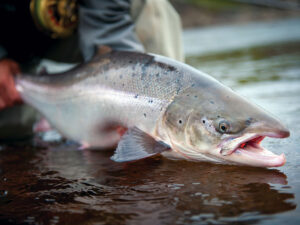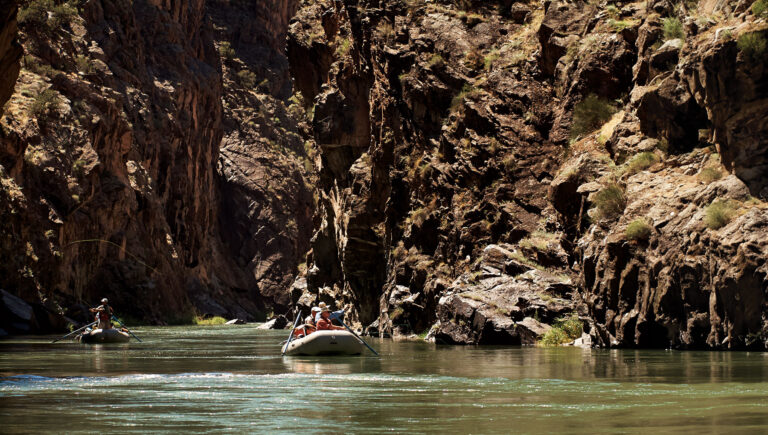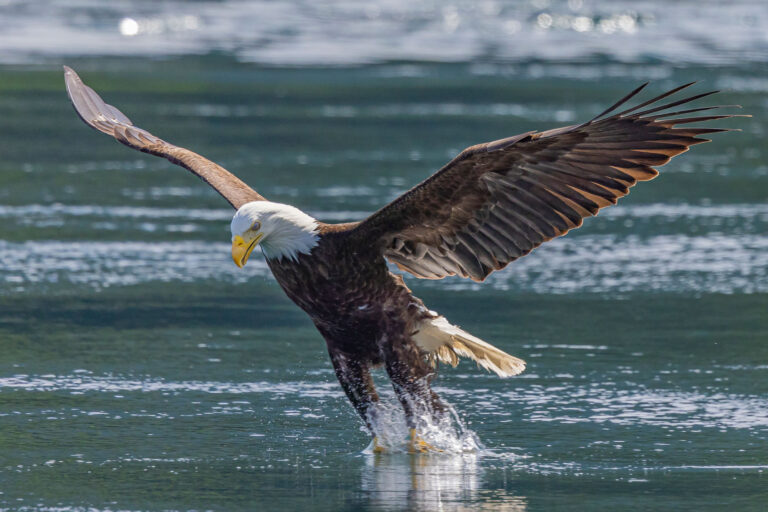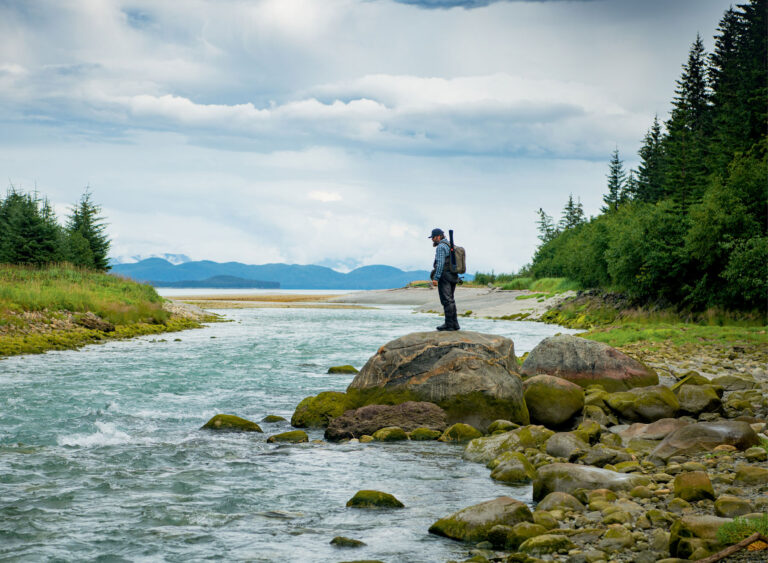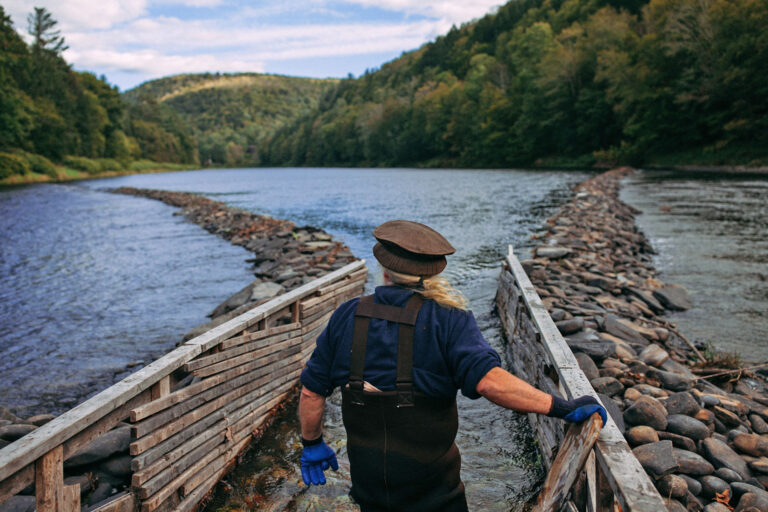Mark Anderson rolls another tobacco-herb “rollie” on the wooden seat of his 15-foot skiff. He lights up, a few sparks fluttering down toward the red gas tank, and tells us to cast under a low-hanging willow. We’re on the Thames, west of London, fishing for pike along the banks of Eton College, where many of Britain’s elite are educated.
“Strip faster, pause longer,” Anderson instructs. After more unanswered retrieves and casts that fall short, Anderson barks, “no, no, no,” as I hang a big red streamer over a log. Anderson shakes his head, exhales a plume of tangy smoke and says, “perfect.”
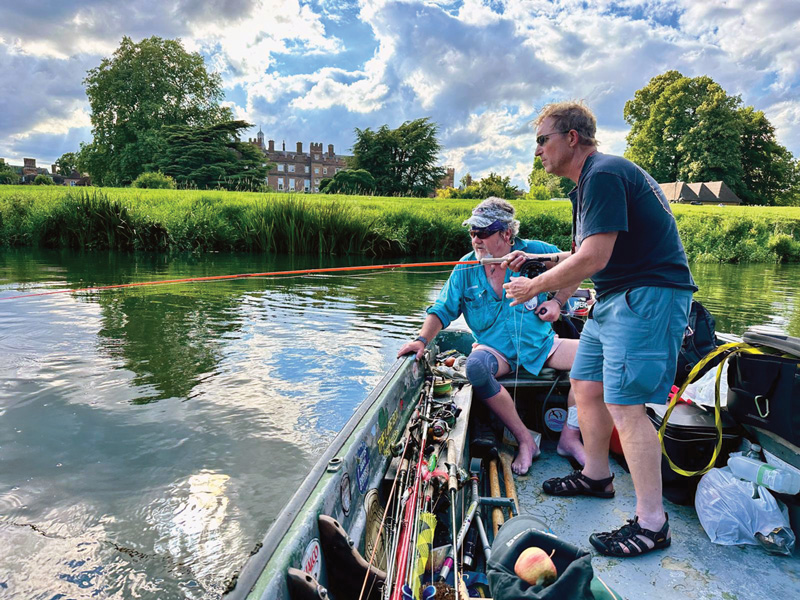
Charles Rangeley-Wilson, my old friend from England who introduced me to Anderson, delivers a precise cast under the leafy branch, strips once and hooks a pike. “That-a-boy, Charlie,” Anderson cheers. After a short, rousing battle, the fish comes to the net and passes through the torn mesh. Anderson curses, eventually boating the 8-pound pike and setting it gently on the landing mat. “Isn’t she beautiful?” he exalts, nearly in tears. “Just beautiful. From this old river. Oh lads, I love it.”
Mark Anderson: A Guide’s Story
Anderson has been fishing the Thames for 30 years as a guide, sportsman and a man seeking relief. “I bloody need this river,” he says. He suffers from dermatitis, high blood pressure, intense hot flashes and fibromyalgia that causes chronic pain. A recent back surgery has helped, but he periodically lies flat in the bottom of the boat or asks me to hoist him up under his arms for a chiropractic adjustment.

Anderson also carries the trauma of growing up in what is now Zimbabwe during the chaotic violence of the 1970s Rhodesian Bush War. “At 11 years old, they put a rifle in my hands and had me join the patrols around the farms. There were horrible things going on.”
His small, rented bungalow in the London suburb of Chertsey is jammed with photos and memorabilia of friends and family, White and Black, who fought for the region’s shifting causes. There are heaps of fishing gear, mounted goliath tigerfish and pike, and various animal skins and bones. “I love the designs of nature,” he reflects, showing us the softball-size eye bone of a marlin. “It’s keeps the eye from bursting when she dives and surfaces.”
Fishing Techniques and Challenges
We motor past the Windsor Castle grounds, wooded parks, palatial estates, run-down cottages and busy, riverine neighborhoods crowded with docks, houseboats and vessels of all varieties. Approaching our first set of locks, Anderson directs me to distract the lock keeper: “Ask him lots of questions. I don’t have a permit.” We tie up and chat with the keeper, who opens the sluice gates and locks, raising us to the next reach.
Upriver, we cast flies and smaller plugs around mossy piers, avoiding curious mute swans and catching a couple of 8-inch perch (very similar to the American yellow perch). A perch well more than a foot in length follows Rangeley-Wilson’s fly right to the boat, its tiger-barred golden hump glowing in the sunny water. The Thames supports a variety of what the British call “coarse fish” — perch, roach, bream, carp, dace and other warm-water species. Rangeley-Wilson, a river historian, reminds us that with its vast, fertile estuary and chalk-stream headwaters, the Thames once boasted some of the best trout and salmon runs in Europe. Centuries of urban pollution nearly killed the fishery by the late 1800s, but major environmental programs have turned its health around.
“Maybe that will happen to me,” Anderson says, guzzling his homemade electrolyte tonic and lighting another rollie. More native brown trout in the upper Thames and even a few wild Atlantic salmon — what Izaak Walton called the “king of freshwater fish” — are finning their way through London.
Memorable Catches and Reflections
For now, pike reign over these storied waters, and 20-pounders are not uncommon. (The British pike record stands at 47 pounds, 5 ounces.) We target the weir pools where these predators capitalize on stunned and injured fish tumbling through the spillway. Anchoring in turbulent, foamy water and casting around concrete structures, we get a few follows but no hits. Dropping a weighted spinner bait into the wall’s shadowed gap, I finally coax a pike from its lair, feeling its strike and short, feisty run. Lifted by our repaired net, the fish reveals a large, healing scar near its tail. “Another monster must’ve grabbed it,” Anderson speculates. This 5-pound “jack,” as smaller pike are commonly called, is clearly a survivor.
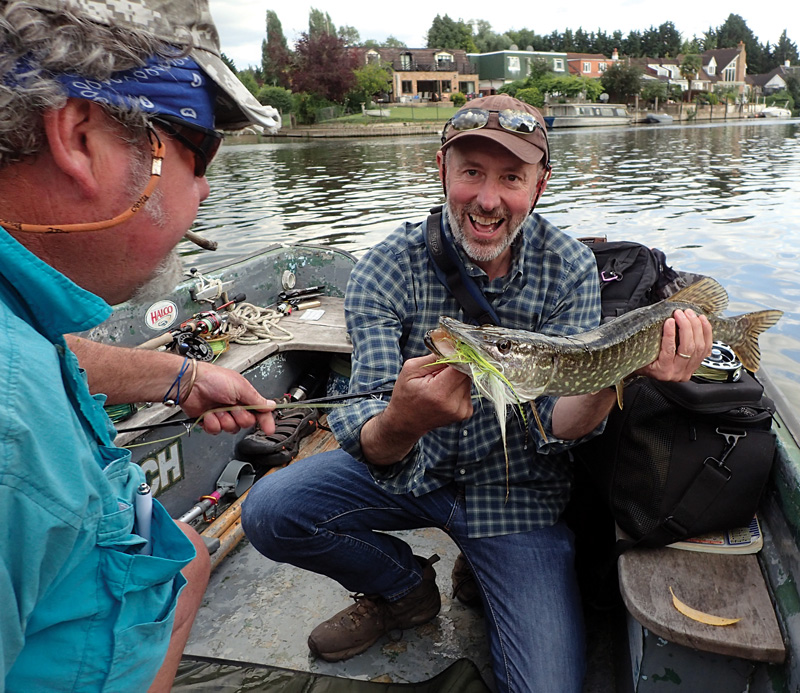
“Let’s celebrate,” Anderson says, handing me a thick, ropey length of biltong, South African jerky traditionally made with such game as springbok and wildebeest. “I’m not sure what’s in this,” he ponders, chewing away. I take a bite and hope for the best.
We fish hard for two days, catching a few pike and perch, buzzing up and down the busy Thames. Anderson talks nearly nonstop, and though he’s rich in knowledge, experience and showmanship, we are relieved when he’s silenced by a large pike that grabs his fly. The huge splash and reel-zinging run draws Anderson into the moment. When the big fish is finally beside us in the net, we gaze at its pale, dagger teeth and the bright, oblong markings down its side, like windows in a double-decker bus on a foggy evening.
“Lovely,” Anderson declares, flushed pink, tears forming in his eyes. “I can’t believe it.” It’s just one of 1,000 or more pike he’s landed over the years — one of the millions caught in the Thames over millennia — yet it moves him deeply.

